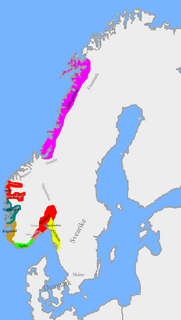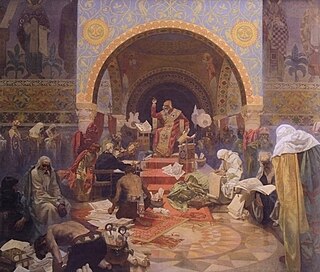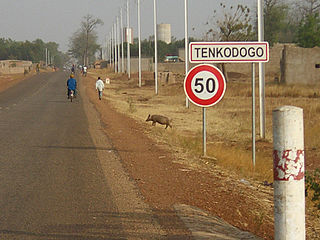These are lists of incumbents, including heads of states or of subnational entities.

Aztec mythology is the body or collection of myths of Aztec civilization of Central Mexico. The Aztecs were Nahuatl-speaking groups living in central Mexico and much of their mythology is similar to that of other Mesoamerican cultures. According to legend, the various groups who were to become the Aztecs arrived from the north into the Anahuac valley around Lake Texcoco. The location of this valley and lake of destination is clear – it is the heart of modern Mexico City – but little can be known with certainty about the origin of the Aztec. There are different accounts of their origin. In the myth the ancestors of the Mexica/Aztec came from a place in the north called Aztlan, the last of seven nahuatlacas to make the journey southward, hence their name "Azteca." Other accounts cite their origin in Chicomoztoc, "the place of the seven caves," or at Tamoanchan.

Sultan is a position with several historical meanings. Originally, it was an Arabic abstract noun meaning "strength", "authority", "rulership", derived from the verbal noun سلطة sulṭah, meaning "authority" or "power". Later, it came to be used as the title of certain rulers who claimed almost full sovereignty in practical terms, albeit without claiming the overall caliphate, or to refer to a powerful governor of a province within the caliphate. The adjective form of the word is "sultanic", and the dynasty and lands ruled by a sultan are referred to as a sultanate.

A ruler, sometimes called a rule or line gauge, is a device used in geometry and technical drawing, as well as the engineering and construction industries, to measure or draw straight lines.

Mahārāja is a Sanskrit title for a "great ruler", "great king" or "high king". A few ruled mighty states informally called empires, including ruler Maharaja Ranjit Singh, founder of the Sikh Empire, and Maharaja Sri Gupta, founder of the ancient Indian Gupta Empire, but 'title inflation' soon led to most being rather mediocre or even petty in real power, while compound titles were among the attempts to distinguish some among their ranks.

The House of Al Sabah is the ruling family of Kuwait.
Khan is a title of unknown origin for a ruler or military leader. It first appears among the Göktürks as a variant of khagan and implied a subordinate ruler. In the Seljuk Empire it was the highest noble title, ranking above malik (king) and emir. In the Mongol Empire it signified the ruler of a horde (ulus), while the ruler of all the Mongols was the khagan or great khan. The title subsequently declined in importance. In Safavid Persia it was the title of a provincial governor, and in Mughal India it was a high noble rank restricted to courtiers. After the downfall of the Mughals it was used promiscuously and became a surname.

The Mandate of Heaven or Tian Ming is a Chinese political and religious doctrine used since ancient times to justify the rule of the King or Emperor of China. According to this belief, heaven —which embodies the natural order and will of the universe—bestows the mandate on a just ruler of China, the "Son of Heaven" of the "Celestial Empire". If a ruler was overthrown, this was interpreted as an indication that the ruler was unworthy, and had lost the mandate. It was also a common belief among citizens that natural disasters such as famine and flood were signs of heaven's displeasure with the ruler, so there would often be revolts following major disasters as citizens saw these as signs that the Mandate of Heaven had been withdrawn.

The Yang di-Pertuan Agong, also known as the Supreme Head or the King, is the monarch and head of state of Malaysia. The office was established in 1957, when the Federation of Malaya gained independence from the United Kingdom. Malaysia is a constitutional monarchy with an elected monarch as head of state. The Yang di-Pertuan Agong is one of the few elected monarchs in the world.
The Malay language has a complex system of styles, titles and honorifics, which are used extensively in Brunei and Malaysia. Singapore, whose Malay royalty was abolished by the British colonial government in 1891, has adopted civic titles for its leaders. The Philippines historically used Malay titles during its pre-Hispanic period, as evidenced by the titles of historical figures such as Rajah Sulayman, Lakandula and Dayang Kalangitan. Malay titles are still used by the royal houses of Sulu, Maguindanao, Buayan, and Maranao on the southern Philippine island of Mindanao, but these are retained on a traditional basis, as the 1987 Constitution explicitly reaffirms the abolition of royal and noble titles in the republic. Indonesia, meanwhile, as a republic, does not recognize hereditary rulers and aristocratic systems. Nevertheless, their royal titles and honors are still used as courtesy titles.

Traditional rank amongst European royalty, peers, and nobility is rooted in Late Antiquity and the Middle Ages. Although they vary over time and among geographic regions, the following is a reasonably comprehensive list that provides information on both general ranks and specific differences.

A princely state, also called native state, feudatory state or Indian state, was a vassal state under a local or regional ruler in a subsidiary alliance with the British Raj. Though the history of the princely states of the subcontinent dates from at least the classical period of Indian history, the predominant usage of the term princely state specifically refers to a semi-sovereign principality on the Indian subcontinent during the British Raj that was not directly governed by the British, but rather by a local ruler, subject to a form of indirect rule on some matters. In actual fact, the imprecise doctrine of paramountcy allowed the government of British India to interfere in the internal affairs of princely states individually or collectively and issue edicts that applied to all of India when it deemed it necessary.

The Chera dynasty (Cēra) was one of the principal lineages in the early history of the present day states of Kerala and Tamil Nadu in southern India. Together with the Cholas of Uraiyur and the Pandyas of Madurai, the early Cheras were known as one of the three major powers (muventar) of ancient Tamilakam in the early centuries of the Common Era.
Bold Ruler was an American Thoroughbred Hall of Fame racehorse who was named the 1957 Horse of the Year after a three-year-old campaign that included wins in the Preakness Stakes and Trenton Handicap, in which he defeated fellow Hall of Fame inductees Round Table and Gallant Man. He was also named American Champion Sprinter at age four. On retirement, he became the leading sire in North America eight times between 1963 and 1973, the most of any sire in the twentieth century. He is now best known as the sire of Triple Crown winner Secretariat, and was also the grandsire of Triple Crown winner Seattle Slew. He was an outstanding sire of sires, whose modern descendants include many classic winners such as California Chrome.

The petty kingdoms of Norway were the entities from which the later Kingdom of Norway was founded. Before the unification of Norway in 872 and during the period of fragmentation after King Harald Fairhair's death Norway was divided in several small kingdoms. Some could have been as small as a cluster of villages and others comprised several of today's counties.

The Trucial Coast were a group of tribal confederations in the south-eastern Persian Gulf, previously known to the British as the "Pirate Coast", which were signatories to treaties with the British Government. These treaties established an informal protectorate by the United Kingdom, and the sheikhdoms, or emirates, were a British protectorate from 1820 until 1 December 1971, when the seven principal trucial sheikhdoms became independent. Six were to form the United Arab Emirates the next day; the seventh – Ras Al Khaimah – joined the Federation on 10 February 1972.

Tsar, also spelled czar, or tzar, is a title used to designate East and South Slavic monarchs or supreme rulers of Eastern Europe, originally Bulgarian monarchs from 10th century onwards. As a system of government in the Tsardom of Russia and the Russian Empire, it is known as Tsarist autocracy, or Tsarism. The term is derived from the Latin word Caesar, which was intended to mean "Emperor" in the European medieval sense of the term—a ruler with the same rank as a Roman emperor, holding it by the approval of another emperor or a supreme ecclesiastical official —but was usually considered by western Europeans to be equivalent to king, or to be somewhat in between a royal and imperial rank.













